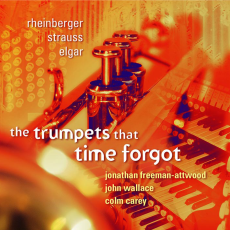Trumpets - Jonathan Freeman-Attwood - The Brass Herald
The Trumpets That Time Forgot was a CD that I approached with much anticipation. Having no knowledge of the repertoire featured (even in its original instrumentation), it gave me great pleasure to learn of exciting new additions to our repertoire. As a player myself, I am constantly with the sheer lack of solo repertoire that is available from the 19th century. Indeed, we have only the Hummel Trumpet Concerto of 1803 and the Oscar Boehme Concerto of 1899 (modelled on Mendelssohn's Violin Concerto) as our choices.
However, it must be stated that the pieces on this CD are not original works for trumpet and organ. The Suite for Two Trumpets and Organ by Joseph Rheinberger was originally for violin, cello and organ. Richard Strauss' Three Movements from the Suite Le Bourgeois Gentilhomme are Movements 5, 6 and 7 of the orchestral suite of the same title. Sonata No 2 by Edward Elgar is a hybrid between the beautiful Severn Suite (for brass band) and his Second Organ Sonata. All the editions of this music have been prepared by the organist on the CD, Colm Carey. Recorded in the obviously immense acoustic of Hereford Cathedral, the results are wonderful - a delectable mix of brilliance, grandeur and understatement. Of course, with world-class players like John Wallace, Jonathan Freeman-Attwood and Colm Carey, the virtuosity and high-quality of the playing comes as no surprise. Wallace and Freeman-Attwood are in their own right fine academics, whilst Carey enjoys a reputation of being one of the most thrilling organists of today.
Joseph Rheinberger's Suite, Opus 149 of 1877 is certainly a rare treasure. The violin part is taken by the Piccolo trumpet of Freeman-Attwood and the cello line is sonorously played by Wallace. It is a four movement work in which there are rich beautiful melodies, flourishes of thrilling technical demands and heroic moments which make you wonder whether Rheinberger had the trumpet in mind all along. The music is sentimental and tender and all concerned play with heartfelt warmth. Special note must be made of the incredible articulation of both players and Wallace's effortless two-octave slurs in the Theme and Variation. Freeman-Attwood's piccolo sound is so sweet and luscious that most of the time you would think there were two Bb trumpets playing. Colm Carey certainly makes the most of the immense organ of Hereford Cathedral in the Finale. In the CD sleeve there are two pages devoted to telling us the registration of the Henry Willis organ: Carey manages to sound both understated and heroic. A substantial work of nearly 40 minutes, Rheinberger's Suite displays influences of Mendelssohn and Schubert but is a work of great charm now enhanced by the golden sound of the trumpet.
We all know the huge technical demands that Richard Strauss enployed for the trumpet in works such as Don Juan and Also Sprach Zarathustra; indeed, his two concertos for french horn are masterpieces in their own right. If only he had written a trumpet concerto! Well, here is the closest thing to it. Three Movements from the Suite Le Bourgeois Gentilhomme is a much more subtle work than the might of the two previously mentioned works by Strauss. however, in the Entree de Cleonte, we are delighted with both the heroic nature and the sprightly aspect of the trumpet. There is a kind of 16th century dance feeling in the middle of this movement - muted trumpets bouncing off the organ with all players taking obvious delight in the change of sound. This work has been scored for brass quintet before but this combination of instruments (again piccolo and Bb trumpets are used) adds a lot more colour and brilliance.
Elgar's Sonata No 2 Opus 87a is a mixture of the Severn Suite and the Organ Sonata No 2. This is achieved as there is an overlap in the material used. Colm Carey employs the trumpet stops in the Introduction to great effect, reminding of what brilliant brass band music the Severn Suite is. In what is a much more sombre affair than the other two works, the musicians explore the impassioned and warm aspects of each other's playing, with both trumpets soaring at the end of the Fugue, finishing with impressive splendour in the Coda.
What a delight it is to hear such music played with the kind of passion and dedication which was originally intended for a composition of different instrumentation. The playing is exciting, powerful, at times moving and best of all, simple. I urge you all to buy this disc as it conveys an aspect of the trumpet many people forget and simply attribute to the cornet - an inspired project with outstanding results
